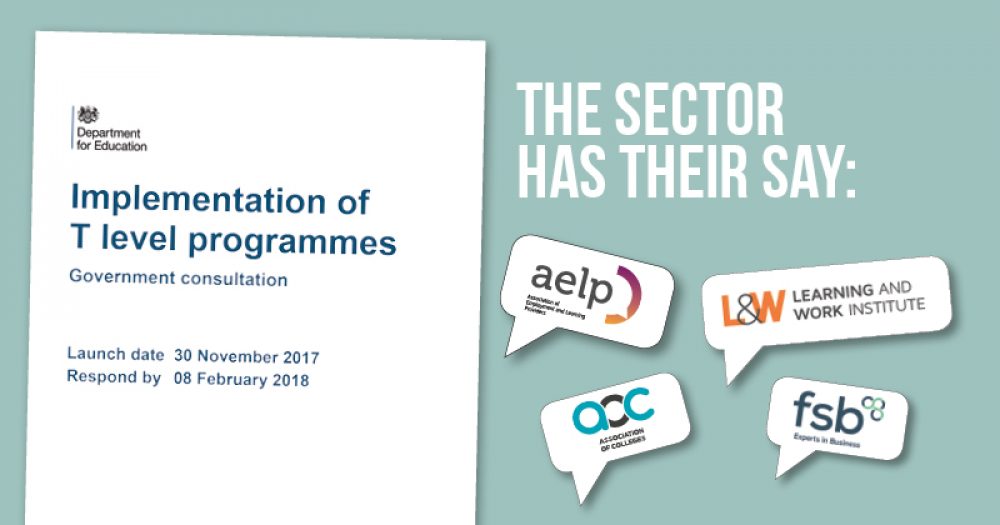Tonight the T Level public consultation closes after running for 10 weeks and seeking answers to 45 questions.
It sought opinions on the planned implementation of the new post-16 technical qualifications, which the government claims will set a new “gold standard” in training, set to emerge from 2020.
Businesses and training providers had the chance to weigh in on numerous sticking points: including how viable it would be for every T-level to include a 45-day mandatory minimum work placement as planned – a requirement described last year as “impossible” by no less than the Association of Colleges.
Respondents also discussed how they thought maths and English provision should be funded, how the proposed “transition year” would work to prepare certain learners before they start their T-levels, and what providers expect their biggest challenges to be.
FE Week asked to see responses to what we see as the six key questions in the consultation. Answers from the AoC, Association of Employment and Learning Providers, the Learning and Work Institute, and the Federation of Small Businesses feature below:

1- Which of the below options for funding maths and English within the T-level programme do you think would be the most appropriate?
Option 1: Provide it from each student’s T-level programme hours
Option 2: Provide the study as additional funded hours on top of their T-level hours
AELP: Option 2. English and maths should attract additional funded hours as separate certificates on top of technical qualification hours, ensuring that T-level technical qualifications are always comparable between individuals and unaffected by whether or not English and maths are also studied. Ideally English and maths should in all cases continue to be studied through the duration of a T-level, beyond the minimum stipulation of the standard, to optimise options for progression, but funding rates will require review to make this prospect viable.
AOC: English and maths should be funded on top of T-levels (option 2). This should apply to transition year learners as well. There should be opportunities to take higher level English and maths where appropriate; greater flexibility in the condition of funding would support this, freeing up staff to teach at level three.
L&W: Learners who need to improve their English and maths skills should have the opportunity to do so, whilst receiving the same amount of technical training as their peers. Otherwise, the disadvantage of poor English and maths skills could be compounded by giving these learners less time to develop technical skills, which potentially reduces their opportunities to progress. Option 2 supports providers to resource English and maths delivery, with the flexibility to integrate English and maths in ways that engage and motivate learners.

2- What do you think the biggest challenges will be for providers in delivering new T-levels and what additional support do you think providers will need?
AELP: The availability of work placements is the single most important factor that will determine whether T-levels can go ahead either locally, or for that matter at all. It cannot be assumed that if there are skill shortages in an area, then there will be companies in the area willing to provide work placements to help address the issue.
Without the availability of work placements, nothing else matters, so while all support will be welcome, the government must be prepared to put time and money into helping and enabling providers to identify suitable placements with employers and facilitate learners getting to them.
AOC: The funding issue is a big challenge; additional funding is for more hours, not an overall increase per hour. Will it be sufficient? There are also ongoing issues with staffing when it comes to training and recruitment. We need to consider the possible lack of facilities and resources.
Stakeholder awareness is also an issue – we must ensure that we engage well with schools, employers and parents.
L&W: The biggest challenge will be implementing work placements, particularly given the scale and range of the placements that will be required. Our call for evidence identified some of these, including: supply not meeting demand, learner readiness for work placements, engaging employers, and timetabling.
Furthermore, our call for evidence identified three approaches to providing support that the DfE could consider:
The DfE publishes guidance for FE providers and employers to ensure consistency of practice in the delivery of work placements.
National promotion of T-levels to engage a wide audience including schools, sixth-form colleges, young people, parents/carers, employers and the FE sector. While activities should aim to raise awareness of opportunities in technical education, this should be an integral part of a wider careers strategy.

3- What support should we consider as part of a transition offer to ensure that students can progress to level three study and particularly T-levels, relating to the proposed transition year?
AELP: The current transition offer implies that a lack of maths and English are the main barriers to accessing a technical education. In turn, this may mean that learners who have achieved a grade four in English or maths, but for other reasons are not ready to progress to a T-level (such as perhaps an interrupted education, caring responsibilities, or other factors), have no transition offer available for them to work towards T-level entry.
A specific transition offer could however be aimed at learners with special education needs, and/or could provide focused discrete learning to prepare learners for level three study, ensuring the hardest to reach can be engaged.
AOC: The transition offer should be funded in line with T-levels. Learners below level three make up 46 per cent of the general FE cohort and are not homogenous. The transition offer should also focus on employability skills including English and maths with a technical/vocational hook.
L&W: One of the main challenges identified through our call for evidence is learners’ readiness for a work environment. As work placements are an integral part of a T-level, learners will need support to develop employability skills to ensure they can appropriately engage with this aspect of their qualification.

4- Should we review qualifications at level two and below, based on the principles that these qualifications should support progression into employment or higher-level study, and have a value in their own right alongside T-levels?
AELP: Level two is an important entry point for those who have been let down at school and have not attained it at the end of compulsory education. More specifically, many occupations require entry at level two no matter the prior learning, so they should be considered as having a standalone value rather than merely as progression vehicles towards level three.
Many technical vocations have not been taught at all in the compulsory education period, making the availability of level two training even more important post-16. Precluding level two from inclusion in the suite of T-levels therefore risks losing a rung to social mobility.
AOC: The government should incentivise some level two qualifications that are well aligned to routes through extra hours and funding. There are already technical certificates available in this space, but more research needs to be done to check whether this is the way forward.
Regarding a level three review, this needs to be robust and include the voice of all key stakeholders. Applied general qualifications support social mobility and progression to higher education. There needs to be an impact assessment on any potential changes to the current qualifications on offer.
L&W: Yes we agree. This needs to be considered as part of technical education reform, of which T-levels are a part. Provision at level two and below are the foundation for further and higher-level learning and therefore act as a stepping stone for many learners.
FSB: Yes. Level two qualifications play an important role in opening up opportunities to individuals who may have additional needs or face challenging circumstances. Many small businesses offer opportunities at this level.
FSB research from 2016 found that 45 per cent of small firms with apprentices offered level two apprenticeships, demonstrating the demand from businesses for programmes and qualifications at this level.
However, the FSB agrees that qualifications at level two and below should be reviewed in order to ensure that they adequately prepare individuals to progress into employment or higher-level study, and to address concerns raised in the Sainsbury Review around the ability of low-level vocational qualifications to enhance career prospects.

5- Do you agree with the proposed approach integrating the work placement within the T-level programme?
AELP: The work placement is the most crucial part of the T-level concept and must provide a worthwhile experience for both the learner and their potential employers if T-levels are to gain traction.
The core competencies of apprenticeship and traineeship providers should therefore be a cornerstone in the building of a new strand of provision in which employer placements are key. AELP believes that key elements of T-level standards should be required to be demonstrated in all work placements for that T-level, rather than let the content of the work placement be designed at an individual provider/employer level, which will emerge from a sector-by-sector approach to design.
AOC: The approach to integrating work placements within T-levels comes with a major challenge of employer engagement, especially at an SME level. Rural and urban environments will have different challenges in terms of access and competition for placements. Roles and responsibilities need to be clearly defined. Flexibility will be required, as it is in many high-performing vocational and education training systems to meet the needs of all students and employers. Paying students for work placements needs to be considered more carefully.
L&W: Yes we agree. Participating in relevant and high-quality work experience improves learners’ employability skills, and will ensure that T-levels remain competitive and valued by employers alongside apprenticeships.
Employers and providers are supportive of work placements as part of the qualifications and any concerns are related to how these would be implemented.
FSB: No. FSB fully supports the inclusion of a substantial, high-quality work placement for all students undertaking a T-level. Time spent in a working environment helps to develop job-specific and employability skills that equip young people to successfully progress into employment or pursue further study.
However, our research shows that over a quarter (27 per cent) of FSB members believe that schools and colleges do not acknowledge business considerations and constraints, such as time and resourcing issues, when trying to engage firms in activities like work experience.
It is for this reason that we are encouraged to see government acknowledge the need for flexibility around the timing and pattern of the 45-60 day placement to suit the requirements of differing industries, but also the capacity of smaller firms to offer work placements in one long block.

6- Do you have any comments about how we might approach the funding of T-levels? How could the funding formula be adapted to distribute funding for T-levels?
AELP: AELP supports funding systems that allow responsive growth in the early stages before settling to a more predictable approach once uptake has stabilised. Partnerships will be key in making T-levels work, particularly in the early stages between those best placed to deliver classroom-based learning and those best placed to manage and administer work placements.
It is vital that funding flows do not limit the ability of the infrastructure to partner or subcontract in ways that encourage high-quality delivery models from emerging. There are also many independent providers delivering innovative study programmes that could form the basis of delivery, and more should be encouraged using a flexible funding system that is provider-neutral and open to all.
AOC: The current funding mechanism and formula works well.
CBI’s thoughts on T-levels
The Confederation of British Industry did not share its responses to the consultation.
Instead, it provided the following comment from Ed Richardson, its senior policy adviser for skills.
“T-levels have the potential to be revolutionary, opening up new routes to skilled work,” he said.
“But they can’t be rushed, or driven by Whitehall targets. Learning the lessons of the apprenticeship levy will help – this has to be a partnership.
“The government needs to work with business on curriculum design and work placements, involving a wider range of businesses in their plans.
“Key priorities for firms are delivering sufficient high-quality work placements, ensuring that there is flexible support for all learners to progress onto level three and ensuring a universal offer on provision in all parts of the country.”









Your thoughts